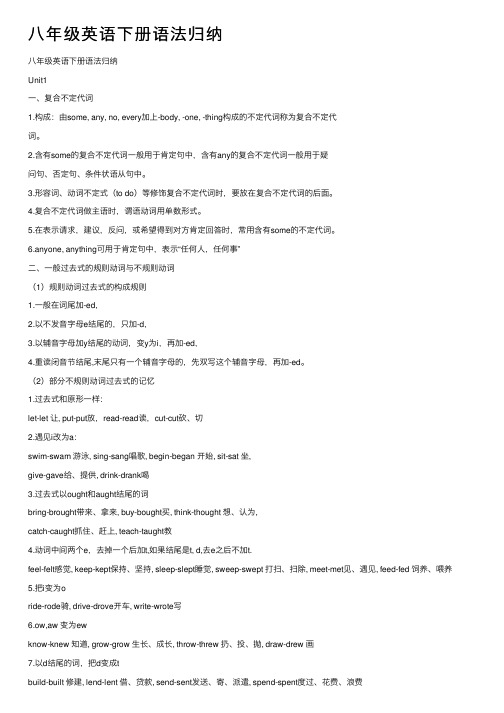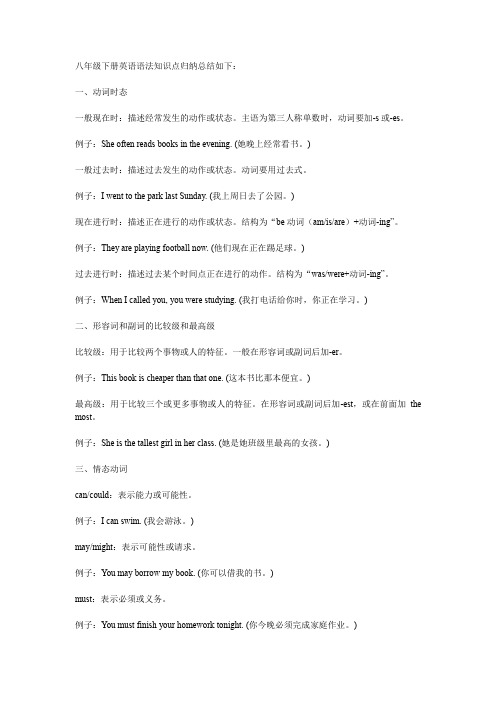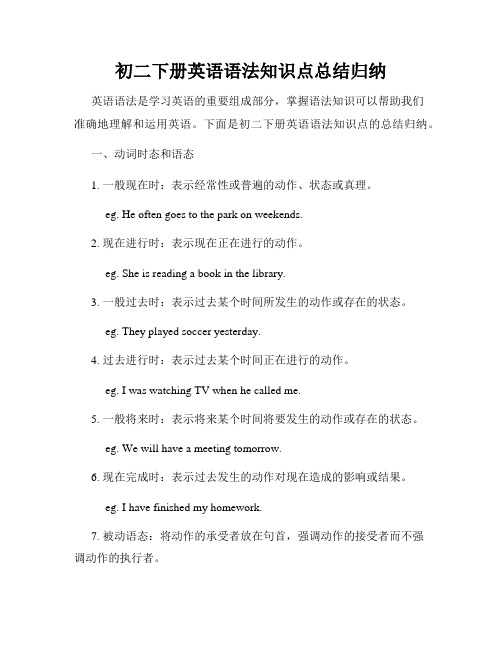初二下册英语语法汇总
八年级英语下册语法归纳

⼋年级英语下册语法归纳⼋年级英语下册语法归纳Unit1⼀、复合不定代词1.构成:由some, any, no, every加上-body, -one, -thing构成的不定代词称为复合不定代词。
2.含有some的复合不定代词⼀般⽤于肯定句中,含有any的复合不定代词⼀般⽤于疑问句、否定句、条件状语从句中。
3.形容词、动词不定式(to do)等修饰复合不定代词时,要放在复合不定代词的后⾯。
4.复合不定代词做主语时,谓语动词⽤单数形式。
5.在表⽰请求,建议,反问,或希望得到对⽅肯定回答时,常⽤含有some的不定代词。
6.anyone, anything可⽤于肯定句中,表⽰“任何⼈,任何事”⼆、⼀般过去式的规则动词与不规则动词(1)规则动词过去式的构成规则1.⼀般在词尾加-ed,2.以不发⾳字母e结尾的,只加-d,3.以辅⾳字母加y结尾的动词,变y为i,再加-ed,4.重读闭⾳节结尾,末尾只有⼀个辅⾳字母的,先双写这个辅⾳字母,再加-ed。
(2)部分不规则动词过去式的记忆1.过去式和原形⼀样:let-let 让, put-put放,read-read读,cut-cut砍、切2.遇见i改为a:swim-swam 游泳, sing-sang唱歌, begin-began 开始, sit-sat 坐,give-gave给、提供, drink-drank喝3.过去式以ought和aught结尾的词bring-brought带来、拿来, buy-bought买, think-thought 想、认为,catch-caught抓住、赶上, teach-taught教4.动词中间两个e,去掉⼀个后加t,如果结尾是t, d,去e之后不加t.feel-felt感觉, keep-kept保持、坚持, sleep-slept睡觉, sweep-swept 打扫、扫除, meet-met见、遇见, feed-fed 饲养、喂养5.把i变为oride-rode骑, drive-drove开车, write-wrote写6.ow,aw 变为ewknow-knew 知道, grow-grow ⽣长、成长, throw-threw 扔、投、抛, draw-drew 画7.以d结尾的词,把d变成tbuild-built 修建, lend-lent 借、贷款, send-sent发送、寄、派遣, spend-spent度过、花费、浪费Unit2频度副词1.表⽰次数、频率的副词称为频度副词。
八年级下册英语语法知识点归纳总结

八年级下册英语语法知识点归纳总结如下:一、动词时态一般现在时:描述经常发生的动作或状态。
主语为第三人称单数时,动词要加-s或-es。
例子:She often reads books in the evening. (她晚上经常看书。
)一般过去时:描述过去发生的动作或状态。
动词要用过去式。
例子:I went to the park last Sunday. (我上周日去了公园。
)现在进行时:描述正在进行的动作或状态。
结构为“be动词(am/is/are)+动词-ing”。
例子:They are playing football now. (他们现在正在踢足球。
)过去进行时:描述过去某个时间点正在进行的动作。
结构为“was/were+动词-ing”。
例子:When I called you, you were studying. (我打电话给你时,你正在学习。
)二、形容词和副词的比较级和最高级比较级:用于比较两个事物或人的特征。
一般在形容词或副词后加-er。
例子:This book is cheaper than that one. (这本书比那本便宜。
)最高级:用于比较三个或更多事物或人的特征。
在形容词或副词后加-est,或在前面加the most。
例子:She is the tallest girl in her class. (她是她班级里最高的女孩。
)三、情态动词can/could:表示能力或可能性。
例子:I can swim. (我会游泳。
)may/might:表示可能性或请求。
例子:You may borrow my book. (你可以借我的书。
)must:表示必须或义务。
例子:You must finish your homework tonight. (你今晚必须完成家庭作业。
)四、被动语态被动语态用于描述事物的状态或描述被动发生的动作。
结构为“be动词(am/is/are/was/were)+动词的过去分词”。
初二下册英语语法知识点总结归纳

初二下册英语语法知识点总结归纳英语语法是学习英语的重要组成部分,掌握语法知识可以帮助我们准确地理解和运用英语。
下面是初二下册英语语法知识点的总结归纳。
一、动词时态和语态1. 一般现在时:表示经常性或普遍的动作、状态或真理。
eg. He often goes to the park on weekends.2. 现在进行时:表示现在正在进行的动作。
eg. She is reading a book in the library.3. 一般过去时:表示过去某个时间所发生的动作或存在的状态。
eg. They played soccer yesterday.4. 过去进行时:表示过去某个时间正在进行的动作。
eg. I was watching TV when he called me.5. 一般将来时:表示将来某个时间将要发生的动作或存在的状态。
eg. We will have a meeting tomorrow.6. 现在完成时:表示过去发生的动作对现在造成的影响或结果。
eg. I have finished my homework.7. 被动语态:将动作的承受者放在句首,强调动作的接受者而不强调动作的执行者。
eg. The book was written by Mark Twain.二、名词1. 可数名词和不可数名词:可数名词可以用来计数,不可数名词无法用来计数。
eg. There are two books on the table. (可数名词)I have some milk in my glass. (不可数名词)2. 单数形式和复数形式:一般情况下,名词在表示多个的时候加-s,但也有一些特殊变化。
eg. One apple (单数) / two apples (复数)One child (单数) / two children (复数)三、形容词和副词1. 形容词修饰名词:形容词用来描述名词的性质、特征等。
八年级下册英语10大语法汇总,超详细讲解

八年级下册英语10大语法汇总,超详细讲解一.询问某人的健康问题及遭到麻烦的表达方法1.询问某人患了何种疾病或遇到了何种麻烦时,常用以下几种结构来表达:What’s the matter (with sb.)?(某人)怎么了?What’s wrong (with sb.)?(某人)怎么了?What’s the trouble with sb? 某人出什么事了?What happened to sb? 某人发生了什么事?Are you OK? 你没事吧?Is there anything wrong with sb.?某人有不舒服/麻烦吗?2.要表达身体疼痛或不舒服,可用以下结构:①某人+have/has+病症The twins have colds.双胞胎感冒了。
②某人+have/has+a+headache/toothache/stomachache/backache/earache. She had a stomachache last night.她昨晚肚子痛。
③某人+have/has+a+sore+发病部位He has a sore throat.他喉咙痛。
④某人+hurt(s)+身体部位或反身代词He hurt his leg.他的腿受伤了。
⑤某部位+hurt(s).My head hurts badly.我头痛得厉害。
⑥某人+have/has+a pain+in one’s+身体部位I have a pain in my chest.我胸口痛。
⑦(There is) something wrong with one’s+身体部位There is something wrong with my right eye.我的右眼有毛病。
⑧其他表达方式She has a heart trouble.她有心脏病。
He got hit on the head.他头部受到了撞击。
She cut her finger.她割破手指了。
八年级下册英语语法(集锦4篇)

八年级下册英语语法(集锦4篇)八年级下册英语语法(1)Unit 5-topic1连系动词的种类及其基本用法一、连系动词的种类。
连系动词也叫系动词,是表示主语“是什么”或“怎么样”的词。
它本身有词义,但不能单独作谓语,后面必须跟表语,构成系表结构来说明主语的状况、性质、特征等。
主要有:be, become, get,turn,grow, look, feel, seem, sound, taste, smell, appear等。
常见的连系动词可分为五种。
状态系动词:只有be一词。
I am used to going about 我习惯于独来独往。
持续系动词:表示主语继续或保持一种状况或态度,主要有keep, remain,stay, rest, lie, stand。
I hope you’ll stay 我希望你身体好。
He always kept silent at 他开会时总保持沉默。
The door remained 门仍然关着。
表像系动词:表示“看起来好像”,主要有seem, appear, look等。
He looks 他看起来很累。
He seems (to be) quite 他好像很快活。
He appeared quite 他显得身体相当好。
感官系动词:表示“……起来”,有feel (摸起来,感觉) , smell (闻起来) ,sound (听起来) , taste (尝起来,吃起来) 等。
This kind of cloth feels very 这种布摸起来很软。
They looked very 他们看起来很累。
It sounds a good 这听起来是个好主意。
This food tastes 这食物尝起来不错。
变化系动词:表示主语变成什么样,即表示从一种状态变为另一种状态。
主要有become,grow, turn, fall,get, go, come, run。
He became mad after 自那之后,他疯了。
英语八下人教版重点语法

英语八下人教版重点语法
英语八下人教版的重点语法包括:
1.过去完成时(Past Perfect Tense):用来表示在过去某个时间或动作之前已经发生或完成的动作。
例如:I had already
finished my homework before my mom came back.
2.时间状语从句(Time clauses):用来表示时间关系的从句,一般以when,as soon as,until,before,after等引导。
例如:We will go to the park when it stops raining.
3.条件状语从句(Conditional clauses):用来表示假设条件的从句,一般以if引导。
例如:If it rains tomorrow, we will stay at home.
4.动词不定式(Infinitives):用来表示目的、原因、建议等。
例如:I went to the store to buy some groceries.
5.被动语态(Passive voice):用来强调动作的承受者而不是执行者。
例如:The cake was made by my mom.
6.定语从句(Relative clauses):用来修饰名词或代词的从句,一般由关系代词who,which,that引导。
例如:The boy who won
the competition is my neighbor.
这些语法结构在英语八下人教版教材中经常出现,需要学生掌握
和应用。
希望以上回答能对您有帮助。
初二下册英语语法总结

初二下册英语语法总结如下:一、一般现在时1. 概念:表示经常发生的动作或存在的状态。
2. 构成:be动词(am,is,are)+动词原形。
3. 句式:肯定句:主语+be动词+动词原形(+其他)。
否定句:主语+be动词+not(+动词原形)+其他。
一般疑问句:Be动词+主语+动词原形(+其他)。
特殊疑问句:疑问词+be动词+主语(+其他)。
二、现在进行时1. 概念:表示正在进行的动作。
2. 构成:助动词be(am,is,are)+动词的现在分词形式(-ing)。
3. 句式:肯定句:主语+be动词(+现在分词)+其他。
否定句:主语+be动词+not(+现在分词)+其他。
一般疑问句:Be动词+主语(+现在分词)+其他。
特殊疑问句:疑问词+be动词(+主语)+其他。
三、现在完成时1. 概念:表示过去的动作对现在造成的影响或过去的动作持续到现在。
2. 构成:助动词have(has)+动词的过去分词形式(-ed)。
3. 句式:肯定句:主语+have/has+过去分词(+其他)。
否定句:主语+have/has+not(+过去分词)+其他。
一般疑问句:Have/has+主语(+过去分词)+其他。
特殊疑问句:疑问词+have/has+主语(+过去分词)+其他。
四、一般将来时1. 概念:表示将要发生的动作或存在的状态。
2. 构成:助动词will+动词原形。
或用be going to do形式表示将来打算做某事。
3. 句式:肯定句:主语+will(+动词原形)+其他。
否定句:主语+will+not(+动词原形)+其他。
一般疑问句:Will+主语(+动词原形)+其他。
特殊疑问句:疑问词+will(+主语)+其他。
或疑问词+be going to do+其他。
八年级下册英语句式语法总结

八年级下册英语句式语法总结一、Unit 1 What's the matter?1. 重点句式。
- What's the matter (with sb.)? = What's wrong (with sb.)? = What's the trouble (with sb.)? 某人怎么了?例如:What's the matter with you? You look pale.- sb. have/has a + 疾病名称。
如:I have a cold.- sb. should/shouldn't + 动词原形。
表示建议,应该/不应该做某事。
例如:You should drink some hot tea with honey. You shouldn't go to bed late.2. 语法。
- 情态动词should的用法:should没有人称和数的变化,后接动词原形,表示劝告、建议等。
例如:He should see a doctor.二、Unit 2 I'll help to clean up the city parks.1. 重点句式。
- I'd like to do sth. = I want to do sth. 我想要做某事。
例如:I'd like to help homeless people.- give out = hand out 分发。
例如:We'll give out food at the food bank.- come up with = think up 想出。
例如:Can you come up with a good idea?- make a difference (to sb./sth.)(对某人/某事)有影响。
例如:Your help can make a great difference to these children.2. 语法。
- 1、下载文档前请自行甄别文档内容的完整性,平台不提供额外的编辑、内容补充、找答案等附加服务。
- 2、"仅部分预览"的文档,不可在线预览部分如存在完整性等问题,可反馈申请退款(可完整预览的文档不适用该条件!)。
- 3、如文档侵犯您的权益,请联系客服反馈,我们会尽快为您处理(人工客服工作时间:9:00-18:30)。
初二下册英语语法汇总Unit6 Fun CyclingTopic1 We’re going on a spring field trip一. 重点词汇( 一) 词形转换:1.discuss(名词) discussion2.queen(对应词) kingfortable(名词) comfort4.safely (形容词) safe (名词) safety( 二) 词的辨析1. find out / look for / find2. cost / pay for / spend on3. other /else4. raise /rise5.each /every6.exciting / excited (三)重点词组:1.go on a visit to 去……旅行2. make the decision 做决定3.bring back 带回4.go on a field trip 去野外旅行5.decide on (upon) sth 对某事做出决定6 see the sunrise 看日出7. make a reservation 预订8. come up with 想出(主意)9. look forward to (doing) sth 期望10. pay for 支付;赔偿11. raise money 筹钱12. book a ticket 订票13. make a room for sb 为……订房间14. have a wonderful time 玩得愉快15. in the daytime 在白天16. a two-day visit 为期两天的旅行17.find out 查出18. some places of interest 名胜19. rooms with bathtub 带浴室的房间20.a hard (soft) sleeper 硬(软)卧21.my pleasure 不客气二.重点句型及重点语言点1. I have some exciting news to tell you. 我有一些激动人心的消息要告诉你们。
to tell you 是动词不定式短语,作定语。
动词不定式作定语时常放在被修饰的名词或代词之后。
如:I have nothing to talk about. He has a lot of work to do.2. Sounds great!= It sounds great! 听起来不错。
3. We will go on a two-day visit to Mount Tai. 我们将要去泰山玩两天。
go on a visit to 去参观/旅游They went to a visit to Egypt last year.类似有:go on a trip / go on a picnic。
a two-day visit 为期两天的旅行a two-month holiday 两个月的假期an eighteen-year-old boy 一个18岁的男孩4.It’s hard to say. 这很难说。
To say 是动词不定式作主语,It 是形式主语。
如:It’s nice to meet you.5. I’ll ask the airline on the phone. 我将打电话问问航空公司。
同义句是:I’ll phone and ask the airline.6. Bring back your information to class tomorrow and we’ll decide on the best way to go on our field trip. 明天把你们查到的信息带到班上来,然后我们来决定最好的郊游方式。
bring back 带回。
Please bring back your library books tomorrow.decide on/upon sth 决定,选定We’re trying to decide on a school.7.It’s too far for cycling. 骑自行车去路太远了。
同义句是:It’too far to cycle there.8.How long does it take to reach Mount Tai by…?乘……去泰山要花多长时间?9.How much does it cost to go there ?去那里要花多少钱?How much does a standard room cost ? 一个标准间的价格是多少?10.We have tickets at 120 yuan for the hard sleeper and 180 yuan for the soft sleeper. 我们的票价是硬卧120元,软卧是180元。
at 意为“以……”,一般用于表示价格,年龄,速度等词的前面,for 意为“供,适合于”。
I’ve got tickets at 80 yuan for The Sound of Music.11.I’d like to book 20 tickets for the hard sleeper. 我要预订20张硬卧票。
20 tickets for the hard sleeper= 20 hard sleeper ticketsbook tickets 预订票book a room for sb/sth 为……预订房间e.g. We want to book some rooms for 14th. 我们想预订一些14号的房间。
12.Please pay for the tickets before 5:30 p.m. 请在下午5:30之前付款。
Pay for 支付pay for sb to do sth 付钱给某人做某事e.g. Her parents paid for her to go to America.她的父母支付她去美国的费用. 13. I want to make a hotel reservation. 我想预订房间。
make a reservation 预订14. We have rooms with a bathtub…我们有带浴缸……的房间。
with 有或带着a house with a swimming poola standard room with two single beds15.It’s very common to raise money in Canadian and American schools. 在加拿大和美国的学校里筹钱是很正常的。
raise money 筹钱We can raise the money ourselves.16.It costs each student one dollar to buy a ticket for the draw.每一个学生花一美元便可买到一张抽奖的票。
(1)each 作主语,谓语用单数Each of the students spends one dollar buying a ticket.. (2)用于单数名词前,作定语,谓语用单数。
Each student has their own e-mail address.(3)用于复数主语后,作主语同位语,谓语用复数。
They each have their own e-mail address.17. I am looking forward to hearing from you . 我盼望收到你的来信。
Look forward to 盼望,期待They are looking forward to solving the problem.三.重点语法动词不定式(1)动词不定式常跟这些及物动词之后,want ,refuse, forget, need , try, learn , like, agree, help, hope ,decide, begin等。
可用顺口溜(要想拒绝忘记,需要努力学习,喜欢同意帮助,希望决定开始)(2)不定式的否定形式是在to的前面直接加not. My mother decided not to buy a computer for me.(3)不定式可以和疑问词who , which ,when, where ,how, what等连用。
Can you tell me what to say at the meeting ? I don’t know how to get to the station.(4)本topic出现的句子有:I have some exciting news to tell you. I want to make a hotel reservation.It is very common to raise money in Canadian and American schools.The best way to raise money is to sell newspapers. I think the most exciting way is to sell flowers in the evening. Kangkang helped us to book the train tickets.Topic2 How about exploring the Ming Tombs ?一、重点词汇:(一)词形转换:1.explore(名词) explore2. east (形容词) eastern3.north(形容词) northern4. push (反义词) pull5.sadly(形容词) sad (名词) sadness6. crowd (形容词) crowded(二)重点词组:1.make a plan 拟定计划2. make sure 确信,确保3. come along with 和……一起来4. at the foot of 在……的脚下5. be surprised at 对……感到惊奇6. be satisfied with 对……感到满意7. out of sight 看不见8. step on one’s toes 踩着某人的脚9. can’t help doing sth 忍不住做某事10. spread over 分布于11.rush out 冲出去12.raise one’s head 抬头13.ask sb for help 向某人求助14.thank goodness 谢天谢地二.重点句型及重点语言点1. While you were enjoying your trip, I was busy preparing for my exams.当你在旅行时,我正忙于准备考试。
